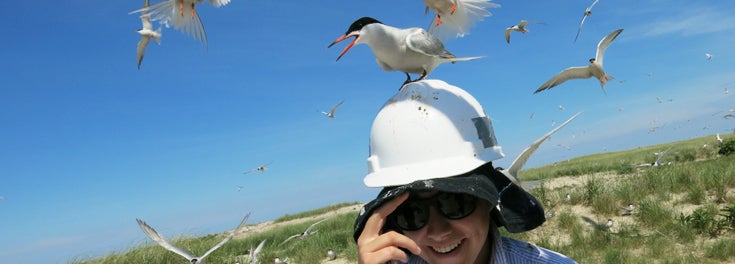 Mary Grande knew that when she conducted research on endangered seabirds, she would have to wear some rather unflattering headgear. But it came in handy when the birds dive-bombed her and dropped all kinds of nastiness on her head. She loved the experience nonetheless.
Mary Grande knew that when she conducted research on endangered seabirds, she would have to wear some rather unflattering headgear. But it came in handy when the birds dive-bombed her and dropped all kinds of nastiness on her head. She loved the experience nonetheless.
A wildlife biology major, Mary spent two summers as a URI Coastal Fellow, an initiative designed to involve undergraduate students in addressing current environmental problems. She called the program a great opportunity to get experience as a field biologist, an “amazing resume builder,” and an excellent way to network with professional biologists. And she got paid, too.
“I really grew as a biologist,” she said. “It helped me learn to ask my own questions and figure out that a lot of times field research doesn’t go as planned. Learning to go with the flow and figure out the next step when encountering a problem is a practical skill I took away from the experience.”
If birds aren’t your thing, don’t worry… You might participate in a project to measure water quality in local ponds, track sharks in Rhode Island Sound, monitor tick populations…
Now in its 21st year, the Coastal Fellows program pairs students with mentors and research staff to help them gain skills relevant to their academic major and future occupations. And if birds aren’t your thing, don’t worry, because research subjects vary tremendously. You might participate in a project to measure water quality in local ponds, track sharks in Rhode Island Sound, monitor tick populations, evaluate the hydrology of vernal pools, assess how an invasive pest is killing native trees, or one of many others.
Katelyn Belleville enrolled at URI knowing she wanted to become a wildlife biologist to study and work with mammals. But after getting her feet wet as a Coastal Fellow conducting research on turtles last summer, she’s rethinking her plans.
“I learned a lot about myself from that experience, from being someone who originally wasn’t that interested in herpetology to being excited to see and hold reptiles and amphibians in the wild,” she said. “They really are amazing creatures—and many are misunderstood and misrepresented. I want to change that view.”
Sophomore Jared Cianciolo spent last summer as a Coastal Fellow studying the soils in salt marshes in southern New England. He visited as many sites as he could each day to collect and analyze soil samples and to identify and record nearby vegetation.
“There wasn’t a day I didn’t learn something new about soils, salt marshes, fieldwork, teamwork, or the natural processes that cause it all,” Jared said. “I applied for the Coastal Fellowship in the soils lab because I had no idea what soil science and fieldwork were about. I fell in love with it, and I’m now pursuing a soil science minor and plan to enter the field upon graduation.”
“Coastal Fellows opened up the world of fieldwork to me, too,” added Katelyn. “I knew I always wanted to be outside, but practicing wildlife biology firsthand gave me the concrete knowledge and experience I needed.”
